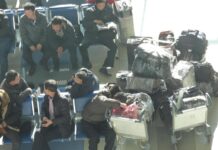“When I was young, I used to play women’s soccer in North Korea. I was really fit and very sure of myself, but poverty stood in the way for me to really pursue my dreams. The regime certainly didn’t make anything easier. In the end, I escaped to China and was really living at the bottom of society. Fear of repatriation was always there, and in the midst of that my first son was born with a heart condition. Things were too dismal for me to see any hope. With the determination to get to South Korea, I finally made it over, but resettlement was no easy task. Every day I would cry, thinking of my home town and my son.”
 Image: Daily NK |
Kim Hui Jeong [pictured left], who escaped from North Korea, has lived through some extremely dark times, but finally feels like fate is on her side, greeting her with a bright, if much belated, smile. She has a hardworking husband whose dedication to her is unwavering and in-laws who support her unconditionally. With the help of her new family, Kim was able to bring over her son from China and afford his heart transplant procedure. Full of gratitude for her family and determination to live her life to the fullest, she was able to focus on work without much difficulty.
A four-hour commute notwithstanding, Kim showed up on time for work every day for three years, never taking even as much as a sick day. Moved by her diligence, the owner of the company presented her with an envelope holding roughly 18,000 USD on her last day at the job. This money is presented to South Korean firms by the government upon hiring North Korean defectors, but the organization decided to give it to Kim instead. She pooled this sum together with her savings to open her own restaurant and pollock-drying operation.
“From the very beginning, I promised myself that I would not sell anything if the quality and taste were not up to my standards—I had to throw away thousands of dollars or fish on a couple of occasions. You might just think I should have sold it anyway, but if you do that, those customers will never come back. My conscience wouldn’t let me get away with that. Not only that, you have to consider that pulling a move like that can give defectors a bad reputation,” she says.
This code of conduct proved to be worth it. Coupled with the expansive network she gained from local volunteer work, her standards ushered in more regulars to purchase her product; her pollock even began featuring on TV home shopping networks.
On the heels of this success, Kim opened a restaurant selling lamb skewers and pollock dishes in 2011, and over the past four years, word of mouth has ushered in a host of regular patrons. The eatery is popular not only among North Korean defectors, but also foreigners and South Koreans searching for a unique taste unavailable elsewhere.
“While running the dried pollock business, I started to make stew with extra parts and selling it on the side. I bought all the spices and ingredients myself to ensure that I knew everything that was going into what I was selling. I only use the best quality meat for my lamb skewers, and for those who actually know their meat…they recognize the difference,” she says.
The dried-pollock stew is Kim’s hallmark—a unique melding of flavors from both Koreas. “Instead of just focusing on the North Korean style, I cook with the South Korean palate in mind,” she explains. “When I was in the North, my home town was right by the ocean. I’d seen my parents work in the fish-exporting business, so I can tell if a fish is good or not with a single glance. I even worked with fish when I was a merchant in China, so I’m pretty confident about what I’m doing.”
When she’s not working at her business, Kim does everything she can to help others in the community; she even delivers North Korean food to defectors to help soothe the inevitable longing they feel for home. “I started my business to make a living, but because of the overwhelming support I’ve received, I feel like our family has enough. What I want to do now, and for the rest of my life, is return that same gratitude and support to those that got me this far,” she says.
*This article was made possible by support from the Korea Hana Foundation [the North Korean Refugees Foundation].

















